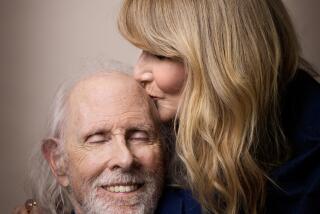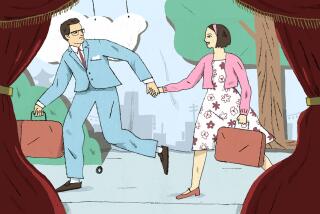Book review: A father and son find common ground in ‘Along the Way’
Martin Sheen was a struggling 21-year-old stage actor when his first son Emilio was born. Sheen, seventh of 10 children in a family that knew him as Ramon Antonio Gerardo Estevez instead of his stage name, was more accustomed to having siblings than being a father. He felt more like a brother to Emilio, and that dynamic has defined their relationship to this day.
In their new memoir, “Along the Way: The Journey of a Father and Son,” the two examine the nature of their relationship and the ways it formed and has informed both of their lives.
Their family is discussed with deep respect —— this isn’t the book you’d read to find out about Charlie’s “winning” meltdown last year. In fact there is very little about Charlie.
Instead, it’s a loving account that’s also very candid, staring unflinchingly at the painful moments, including Martin Sheen’s alcohol-fueled psychotic breakdown on the set of “Apocalypse Now,” seen through Emilio’s eyes and recalled with the humiliated clarity of a self-conscious teenager.
“There are a lot of truths that are revealed, but they are really about us and our relationship,” says Estevez over lunch with Sheen at Shutters on the Beach in Santa Monica. “I always imagine that the people who have come and gone in my life are gonna go straight to the index to see how many times their names are mentioned. But this is not one of those books. We don’t trash anybody.”
It’s a cool, windy afternoon, and Sheen and Estevez are at a quiet back table. The Pacific Ocean glistens through the windows and the air smells clean and salty. Sheen eats a salad and listens to Estevez talk, nodding now and again. His silence, Estevez says adamantly, is rare. “He’s such a windbag,” Estevez says, smiling.
The book unfolded over a period of a year and half during which Edelman conducted extensive interviews with both men, had those interviews transcribed, wrote her interpretation of those transcripts and handed them off to Sheen and Estevez, who edited and rewrote as necessary.
“She’d send the transcripts back to us and we’d read them and say, ‘Oh my God, you can’t put this in the book,’” says Sheen, finishing his salad and coming alive with jovial animation.
Sheen and Estevez have a natural back-and-forth that is at once playful and firm, warm and exasperated. Perhaps this is because Sheen has relied on Estevez. When the family relocated to Malibu, Estevez often took on the role of parent, watching out for his three younger siblings when his parents were busy with Sheen’s rising career.
When Estevez was a boy, Sheen took him and the rest of the family to live on set wherever he happened to be shooting. Mexico for “Catch-22,” Colorado for “Badlands” and the Philippines for “Apocalypse Now.” It was during filming of the latter that a concerned Marlon Brando disrupted a fight between the then-14-year-old Estevez and his 36-year-old father. The two had come to blows when Estevez expressed rage at the fact that he could not go back to high school with the rest of his friends when the film’s shoot ran over into the fall. Despite the drama of the moment, it’s one of the few instances of great discord that father and son can recall.
More often than not, Estevez enjoyed watching his father work, eventually becoming interested in a career in acting himself. His early roles in the 1980s included “The Breakfast Club,” “St. Elmo’s Fire,” “Repo Man” and “Maximum Overdrive.”
Now that Estevez is nearly 50 and Sheen 71, Sheen says he feels only common ground with his son. The feeling is shared by Estevez, who writes in the book that he is grateful for Sheen, “[t]he man who for so many years walked ahead of me, who briefly walked a separate path, and who now walks by my side.”
Originally, the book was going to be a companion piece to Estevez’s 2010 film, “The Way,” which starred Sheen and was filmed in Spain, but “then we sat down and started telling the stories and it became a whole other thing,” says Estevez. “He opened up a Pandora’s box and I was inspired and terrified concurrently by how much he had said.”
Both men agree that talking with Edelman turned into a form of therapy.
“And I hate therapy, and I’ve tried, I’ve gone to therapists before,” jokes Estevez. “I don’t have a confessor like he does.”
“That’s the advantage of being Catholic; it’s also very cheap,” says Sheen.
Spirituality — Sheen’s Catholicism and Estevez’s quest for a personal spirituality, which eventually leads him to farming and planting his own vineyard — is at the heart of the book, as is the nature of family relationships and what it means to at once love another human and allow them to walk their own path. Though Sheen’s wife and Estevez’s mother Janet is dealt with sparely, it is clear that she has always been — and still is — the glue that holds the family tightly together.
“The book isn’t trying to be hip or cool or edgy,” says Estevez. “It’s just an honest portrayal of what we’ve been going through for 50 years, and we’re not unique, we just happen to be on a stage in a way that many people are not, and that has its advantages and disadvantages.”
More to Read
The biggest entertainment stories
Get our big stories about Hollywood, film, television, music, arts, culture and more right in your inbox as soon as they publish.
You may occasionally receive promotional content from the Los Angeles Times.







